The European Union approved a reform targeting the union’s policies relating to the approval and deportation of those seeking asylum within member states on Wednesday.
A Long Sought Reform:
Reforms targeting the EU’s asylum policies have been heavily debated within the EU for nearly eight years since initial reforms were proposed, with the now approved reform ending the nearly decade long deadlock.
The reform includes policies such as faster deportations, more data collection for prospective asylees, alongside redistribution from overburdened EU states.
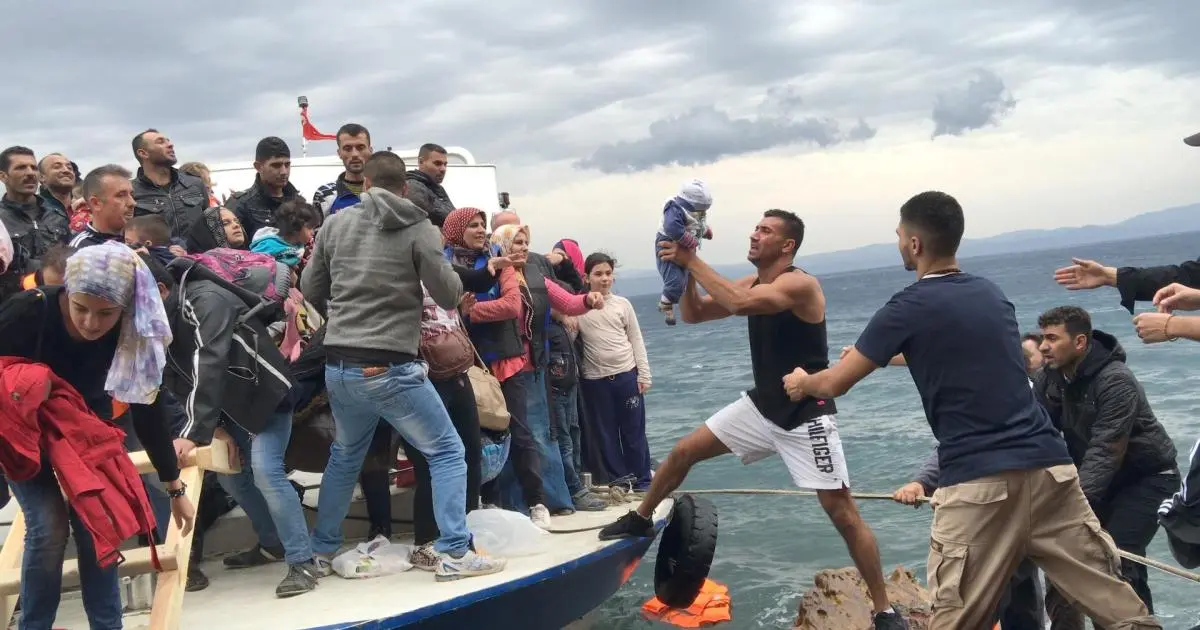
A key portion of the reforms includes the deportation of asylees who have little chance of obtaining asylum. The new policy would see the detention of those with a nationality whose acceptance rate for asylum is less than 20 percent who would then be processed for asylum at the site of detention in a process which would take a maximum of 12 weeks. Those who have “no prospect” of asylum would be immediately deported beyond the EU’s external borders.
However, unaccompanied minors would be exempt from these new measures. While Germany had petitioned to add further protections for families with children, a petition which would ultimately be rejected by the EU.
The reforms will also bring further and more intensive data collection of prospective asylees, with the introduction of a pre-entry screening procedure which includes obtaining applicants over the age of six biometric data which will be stored within the EU’s Eurodac database while health and security checks which will last a maximum of seven days will also be introduced. This data collection will allow authorities to document if applicants may present a security threat or if they were armed or violent during initial contact.
Those Who Stand Against:
One of the more controversial parts of the reforms consists of what is referred to as the “solidarity mechanism,” which intends to redistribute a number of refugees equal to 50% of the hosting country’s population and GDP, with a minimum of 30,000 refugees from countries that struggle with the processing and containment of refugees, such as Italy, Greece, and Spain, to other member states.
Those who refuse to accept refugees from other member states will have to pay 20 thousand euros per refugee refused or provide a minimum of 600 million euros in “equipment or experts such as lawyers.”
This policy has been met with fierce backlash from some European officials, with Polish Prime Minister Donald Tusk stating, “We will find ways so that even if the migration pact comes into force in roughly unchanged form, we will protect Poland against the relocation mechanism.”
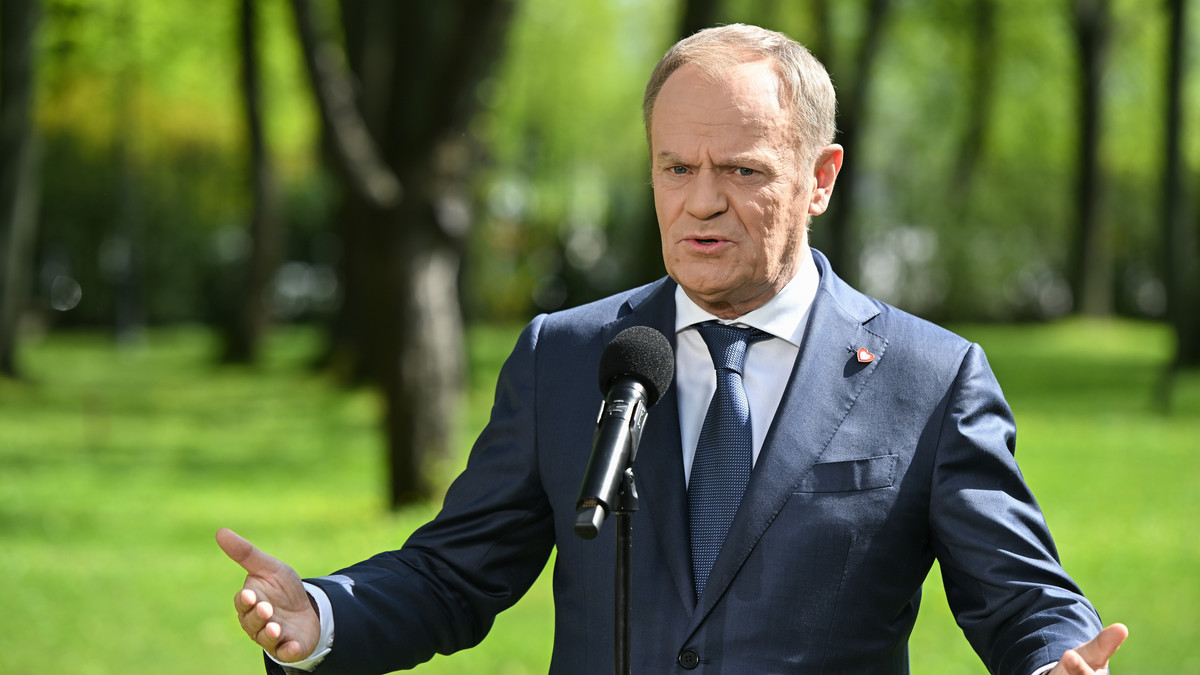
Tusk was joined by his Hungarian counterpart, Prime Minister Viktor Orban, who claimed the reforms were forced upon the EU, equating them to Europe being “legally raped.”
Officials opposed to the reforms weren’t alone. A number of protestors dressed in white t-shirts entered the public gallery and began to shout “This pact kills; vote no!” at MEPs, protestors then began to throw paper airplanes with the coordinates of shipwrecks transporting migrants while en route to Europe.
The reforms brought dissent from both the left and the right, with the EU’s Green Party and their fellow leftists voting against eight of the ten proposed reforms, claiming that the reforms failed to protect guarantees for human rights.
Their right-wing counterparts stood against the reforms, with those dissenting including members of parties such as France’s Rassemblement National, Spain’s Vox, Poland’s Law & Justice, and Hungary’s Fidesz.
Right-wing politicians claimed the reforms were a blow to the sovereignty of members of the EU and that the reforms would help facilitate operations carried out by human traffickers and would lead to a large increase in illegal immigration into the EU.
Alexander De Croo, Belgium’s Prime Minister, spoke against those opposed, claiming that those against the reforms were leaving countries struggling with asylees to face Europe’s ongoing refugee crisis alone.

Furthermore, a number of outside organizations spoke out against the reforms, with Amnesty International calling them “shameful,” while the organization’s head of EU institutions, Eve Geddie, claims the agreement will “lead to greater human suffering.”
“For people escaping conflict, persecution, or economic insecurity, these reforms will mean less protection and a greater risk of facing human rights violations across Europe,” continues Geddie, “including illegal and violent pushbacks, arbitrary detention, and discriminatory policing.”
Amnesty International was joined by Caritas Europa, a confederation of Catholic humanitarian groups in Europe, who opposed what they referred to as the “imprisonment” of families and children alongside the “discriminatory pre-sorting of those seeking protection and the outsourcing of the asylum issue to third countries.”
Another organization, Equinox, claimed the reforms “will bring a deadly new era of digital surveillance of migrants, and more tech will be used to criminalize people entering Europe.” Referring to the increased security and documentation measures imposed under the reforms.
The Final Processes:
With the reforms passing in the European Parliament, all that remains is for those in the European Council which is made up of the heads of states of nations within the EU to approve the reforms, an approval which is expected to pass with only a handful of heads of state openly disagreeing with the motion at the moment.
If the reforms are approved by Council, EU states will have two years to implement the new regulations.
Europe’s Ongoing Migrant Crisis:
Europe has struggled to handle those arriving on the continent seeking asylum since the 2015 refugee crisis, which saw over 800,000 refugees make the treacherous trip across the Mediterranean and into European countries like Greece and Italy.
The crisis has taken a toll on countries across southern Europe, with countries such as Italy, Greece, and Spain being common gateways into Europe and, thus, asylum. In Lampedusa, a small Italian island, the native population has previously been outnumbered by incoming refugees pouring onto the island, with many coming from nations within Northern Africa due to the island’s close proximity to the continent.
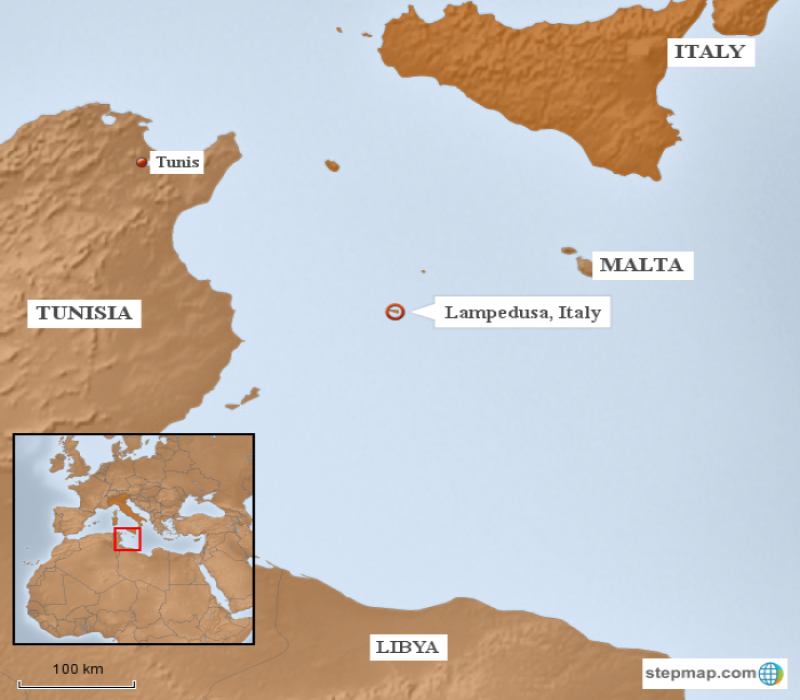
Many new arrivals, which number in the thousands, are transported from Lampedusa to larger migration centers in mainland Italy and Sicily; however, some locals have previously expressed concerns that the Italian government may look to expand the island’s migrant capacity.
Locals went as far as to physically block the convoy of Italian Prime Minister Giorgia Meloni, who was accompanied by European Commission President Ursula von der Leyden in September. With protestors lining the streets, preventing the Prime Minister’s convoy from moving, Meloni stepped out of the vehicle transporting her, promising locals that she would work to alleviate the pressure they face.
While many seeking asylum have done so peacefully, there remain a number of violent cases wherein new arrivals clash with local authorities while demanding asylum. These migrations don’t just hurt those native to the island, as dozens of new arrivals are rushed to local hospitals suffering from illnesses, dehydration, and a plethora of other critical health issues.
Many other prospective asylees have met their end on the treacherous journey across the Mediterranean, with shipwrecks due to overcrowded marine vessels and botched landings taking the lives of hundreds of thousands of migrants. Many of these incidents remain preventable, with the majority being caused by smugglers overcrowding their vessels and forcing refugees to set sail amid unfavorable conditions, including gale force winds and continuous heavy rain.
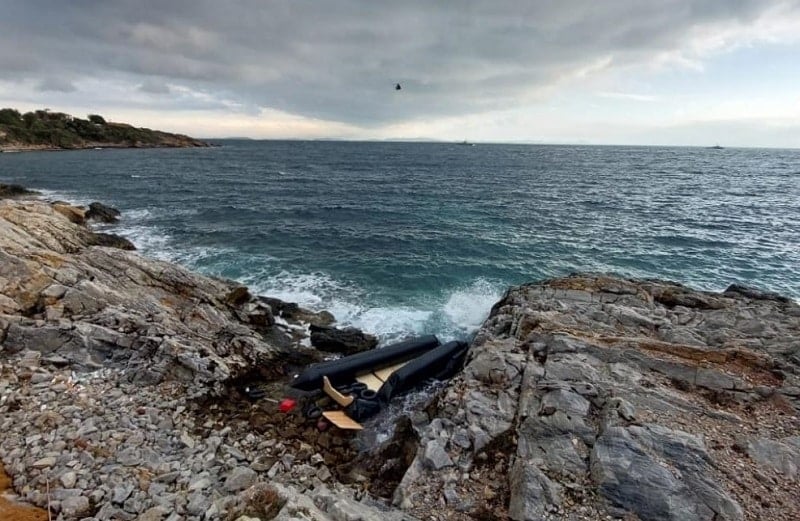
In Greece, human traffickers send refugees towards the Hellenic nation in droves from Turkey in operations that Greek officials claim are sanctioned by the Middle Eastern nation.
One such case of human trafficking occurred in February of last year, when five migrants lost their lives while 41 others were left stranded at sea after the ship transporting them sank. Greek authorities mobilized after a woman’s drowned body was reported. Authorities launched three vessels, a helicopter, and a number of private vessels owned by locals, recovering the woman’s body alongside several other migrants.
Authorities rescued 40 people, including 17 men, 17 women, and 6 children, one of whom was unconscious. Three of the children later died while receiving medical care at a local hospital, bringing the total death toll to four.
Following the conclusion of the operation, Shipping and Island Policy Minister Yiannis Plakiotakis commended both the Greek Coast Guard and civilian actors in a statement, “Officials of the Coast Guard—Hellenic Coast Guard, once again proved that their primary concern is the protection of human life in rescuing, under particularly adverse weather conditions, 41 of our fellow human beings.”
“Unfortunately, we have, for yet another time, innocent victims who lost their lives because of the criminal stance of human traffickers.” Plakiotakis continued before claiming that many migrants “start off from Turkey, under the tolerance of Turkish authorities.”
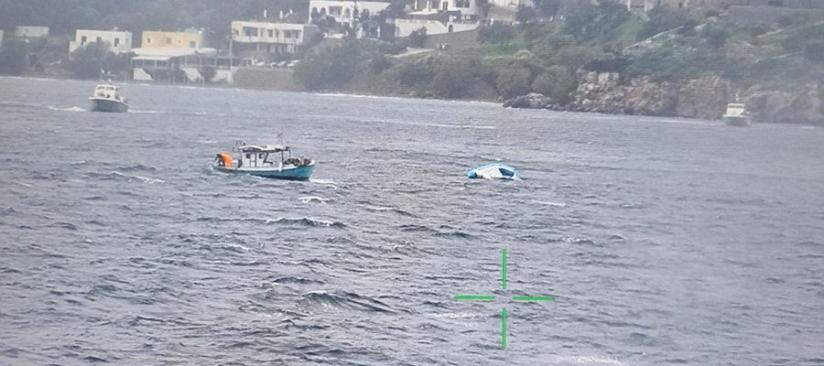
Spain has also seen a large number of migrants seeking asylum on the nation’s Canary Islands, located off the coast of West Africa, with thousands of migrants arriving in the islands in mere weeks. The islands recently saw a severe influx of refugees in October, with 8,561 migrants having arrived on the island’s shores, breaking a previous record in 2006 amid another refugee crisis.
Spanish Interior Minister Fernando Grande-Marlaska stated that the severity of migration was due to political “destabilization in the Sahel” during a visit to the islands. The voyage to the Canary Islands is one of the most dangerous in the world, with at least 559 people, including 22 children, having died in 2022 while attempting to reach the islands, according to the UN’s International Organization for Migration.
While overall cases of refugees arriving in Europe have decreased, 2023 saw an increase of over 50 thousand refugees arriving through Europe’s “central route,” which consists of routes from Northern Africa to Italy. This trend has slowly been increasing through the years, with a nearly 40 thousand increase in refugees arriving through this route between 2022 and 2023 and a 30 thousand increase for the year prior according to Frontex and the Spanish Ministry of Interior.
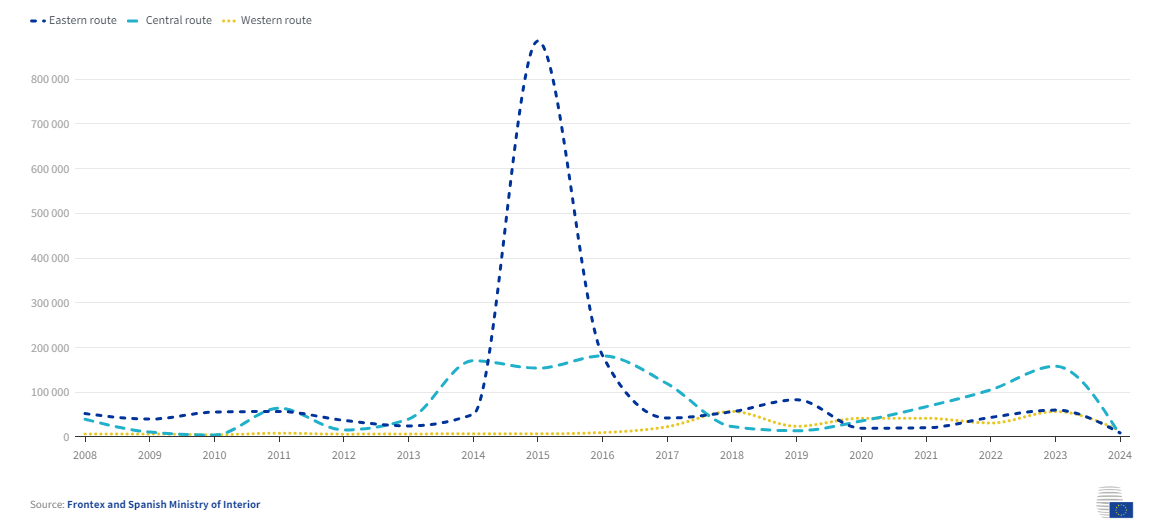
Analysis:
The reform remains controversial among more radical members of the European Parliament alongside various human rights groups but has enjoyed a fair amount of support from members of Europe’s moderate parties.
While many of the reforms may be effective in combating the ongoing refugee crisis in Europe, there remains a number of concerns both regarding the rights of those seeking asylum alongside nations which seek to protect their borders from the influx of refugees and sovereignty from what some see as the overreaching of the EU.
The increase in documentation of migrants entering Europe and the policy of expediently processing asylum requests on site could help reduce the pressure on nations such as Italy which has regions where the native population is outnumbered by those seeking safety in Europe.
Jorge Buxade Villalba, a member of Spain’s Vox party claimed that the reforms did not sufficiently protect Christian refugees from Africa alongside the Spanish nation from migrants seeking entry into Europe from the western migratory channels which has seen a significant increase in recent years.


